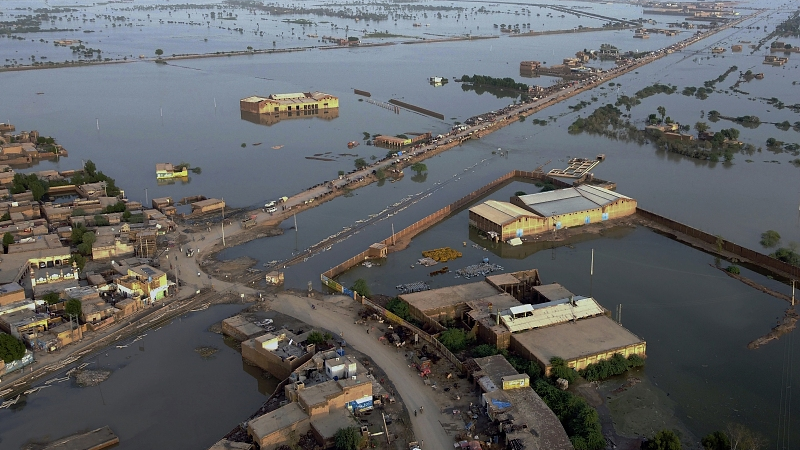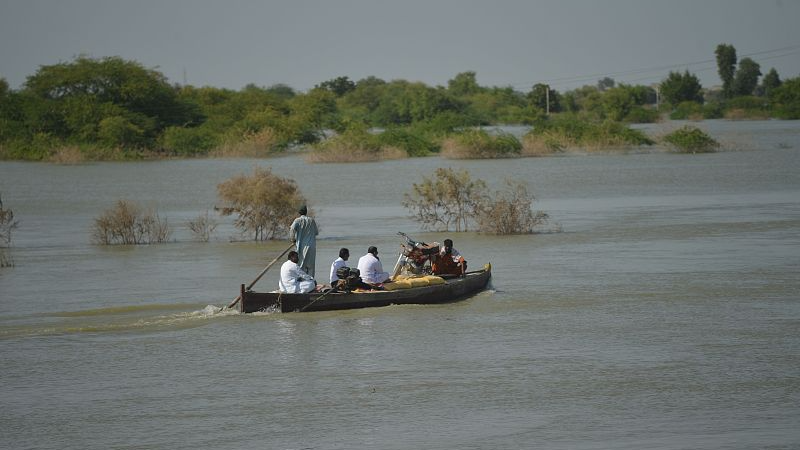
Homes are surrounded by floodwaters in Baluchistan, Pakistan, August 29, 2022. /CFP
Homes are surrounded by floodwaters in Baluchistan, Pakistan, August 29, 2022. /CFP
Editor's note: Bradley Blankenship is a Prague-based American journalist, political analyst and freelance reporter. The article reflects the author's opinions and not necessarily the views of CGTN.
Given the high stakes and recent devastating floods in Pakistan that caused tens of billions in damages and displaced tens of millions of people, the upcoming 2022 United Nations Climate Change Conference in Egypt could not be more relevant. One of the most critical issues expected to be discussed during the meeting, dubbed COP 27, is climate reparations. This remains a perennial point of contention.
The idea is that countries, which have contributed the most to the climate crisis, should compensate and assist countries that are the most impacted by climate change. This stands in line with what diplomats call "loss and damage," which ought to morph into a formal legal framework in the coming years.
According to a report by Bloomberg, the United States, the world's largest economy and the political center of the Western world, is on board with reparation talks. However, officials cited by the paper are stopping short of "any explicit push for new aid or funding in an agenda item framing the talks." Apparently, the U.S. stands squarely against a large group of nations that are vulnerable to extreme climate events.
Likewise as seen in last year's COP 26, the European Union joined Washington in halting concrete measures to assist hard-hit countries. Their collective insistence to dismiss any measure that would support them, the highest historical contributors to carbon emissions, pay out dividends to developing countries in critical need of assistance halted any deal during that time.
But as stated earlier, the recent devastating events in Pakistan have made it more salient to support reparations. Unfairly, countries such as Pakistan have contributed the least toward carbon emissions over the past 200 years since the the era of the Industrial Revolution and are suffering the most.
Accordingly, the largest negotiating bloc at COP 27, the Group of 77 (G77) and China, has insisted on adopting a formal mechanism for assessing "loss and damage" and issuing compensation. This is a key consideration for climate justice. Countries that have hardly contributed to the breakdown of our planet's natural climate should not be required to face the challenges alone.

Internally displaced people use a boat to cross the flooded area, Sindh, Pakistan, September 27, 2022. /CFP
Internally displaced people use a boat to cross the flooded area, Sindh, Pakistan, September 27, 2022. /CFP
This is true when the climate crisis will impact developed countries, even if they believe now they are insulated from it. One key consideration is the looming climate refugee crisis. The floods in Pakistan displaced millions of people and instigated a major refugee crisis in the South Asian country. As the negative effects of climate change deepen, this is an issue that will become much more pronounced in the future – and governments in Europe and North America are already reeling with a refugee crises now spurred by global conflicts, never mind climate change.
Accordingly, climate reparations should not be deemed a mere handout but rather an investment for the future. Helping countries to overcome the challenges brought about by climate change with aid and investment can mitigate the impact of climate change that will materialize in the near future. Recipient countries can tackle these challenges more effectively before they lead to an even bigger crises.
Any discussions of climate justice should be met with more ambitious goals from Western countries in cutting emissions and reaching carbon neutrality. The EU has set a goal and established a Green Deal; however they fall short of what's required from the 27-nation bloc in order to meet the UN-established goals. The U.S. President Joe Biden administration has set out less ambitious goals for the world's largest economy, since the United States, and a series of internal political and judicial rows mean that achieving them could be impossible.
Western countries need to go beyond paying lip service on climate justice and to act accordingly. Concerns over "corruption and waste" routinely brought forward by these countries in explaining their reluctance to assist developing countries are just finger-wagging and a waste of time. The reality is that Climate change is no longer an issue for the future and UN-issued goals are no longer tenable. The focus must be about mitigating the human toll of the climate crisis, starting with paying out losses and damages to the most impacted countries.
The prospects of any diplomatic breakthrough on losses and damages are low given the consensus that's needed under this UN format. But without this bare minimum, humanity will not be equipped to address the most pressing humanitarian crisis we have ever collectively faced. This fact alone should send shockwaves through each and every Western capital.
(If you want to contribute and have specific expertise, please contact us at opinions@cgtn.com. Follow @thouse_opinions on Twitter to discover the latest commentaries on CGTN Opinion Section.)